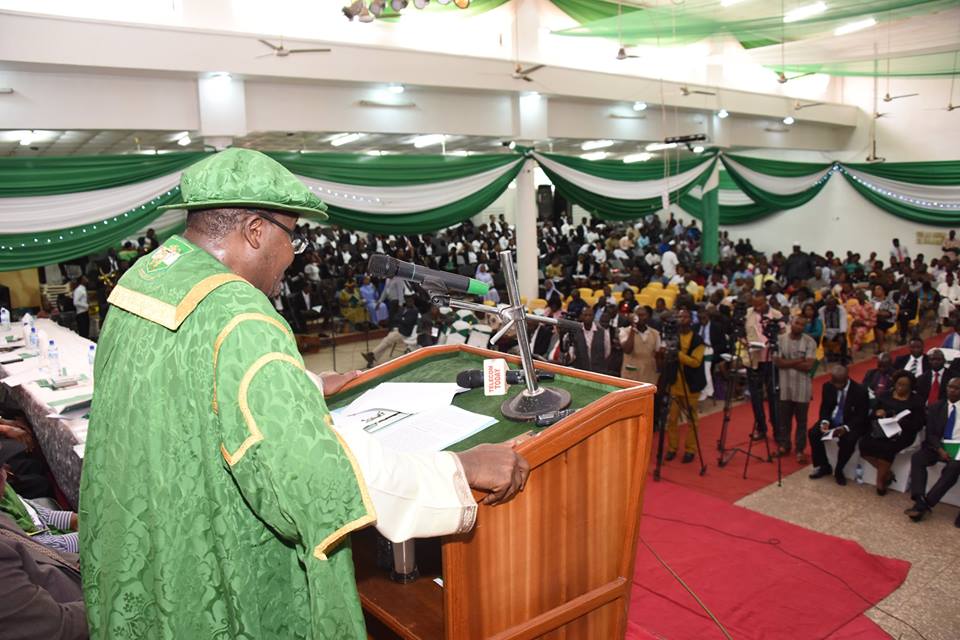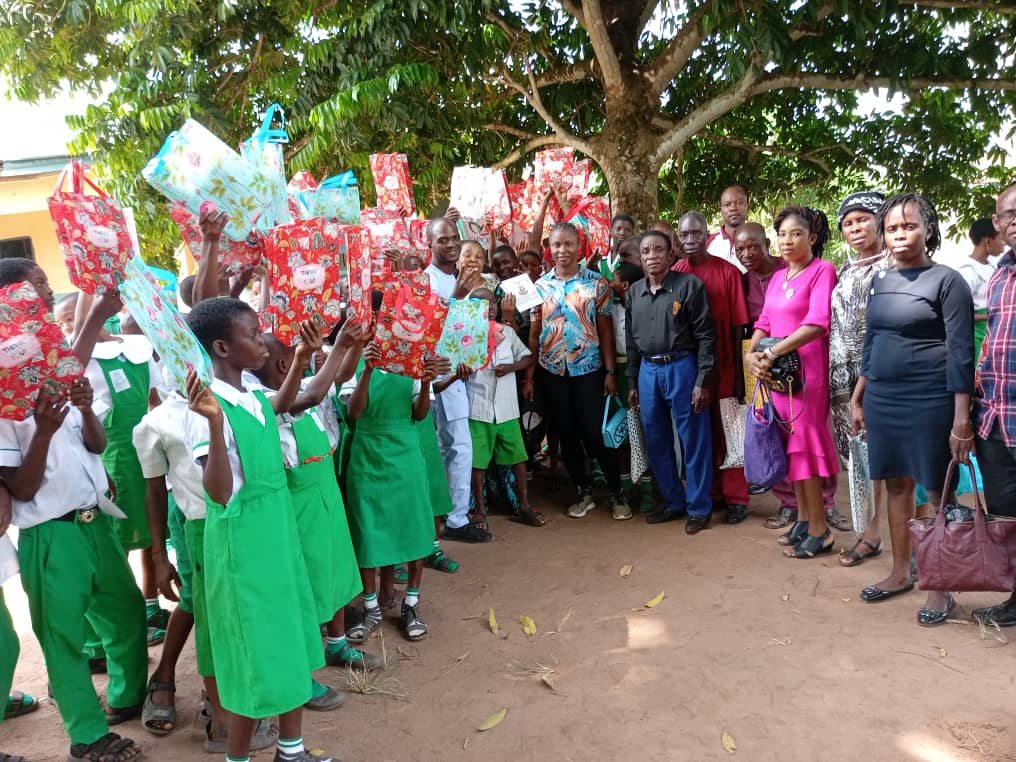Education
UNN, Others Hail NCC’s Involvements in Tertiary Education


By Dipo Olowookere
The Nigerian Communications Commission (NCC) has been commended for its interventions in tertiary education in Nigeria.
This commendation was made the 46th Convocation Lecture of the University of Nigeria (UNN) held at the Princess Alexandra/Unity Hall of the University’s Main Campus in Nsukka.
At the occasion, chaired by the President of National Industrial Court (NIC), Justice Babatunde Adejumo, the NCC was applauded for the great interventions it instituted to bridge the digital divide and to enhance national transformation
The entire university community led by the Vice Chancellor, Professor Benjamin Chukwuma Ozumba, gathered to receive the lecture delivered the CEO of NCC, Professor Umar Garba Danbatta.
Professor Danbatta recalled that the deployment of ICT infrastructure in the precinct of the Nigerian tertiary institutions nudged the establishment of the Nigerian Research and Education Networks (NgREN), which ensures that Universities communicate, collaborate, access and share resources. The overarching advantages in deploying ICT in education include the fact that through ICT, images can easily be used in teaching and improving the retentive memory of students; teachers can easily explain complex instructions and ensure students’ comprehension; and teachers are able to create interactive classes and make the lessons more enjoyable, which could improve student attendance and concentration.
He outlined and explained in details several intervention initiatives, programmes and projects the NCC inaugurated, and also mention the remarkable and measurable impact they have had on the realities in the education sector in Nigeria.
He said these programmes, projects and initiatives include:
Broadband infrastructure and facilities to the universities and other institutions of learning in Nigeria; and access programmes which include twelve (12) ICT/CBT Centres that are on-going under Stakeholders Initiated Project (SIP); as well as additional 4 skills acquisition Centres which are also scheduled for completion soon.
There is also the Tertiary Institution Knowledge Centers (TIKC), an initiative of the Universal Service Provision Fund (USPF), a Department in NCC. The TIKCs are designed to promote the use of ICT tools in teaching and learning at tertiary institutions and their neighbouring communities.
In addition to the above are the Digital Bridge Institute (DBI) Learning Centres established with training facilities and equipped with modern ICT infrastructure for training engineers, ICT professionals, policy makers, and regulators in the relevant and related sectors of the economy. Currently there are five (5) DBI learning centres across the country – Yola, Enugu, Asaba, Oshodi and Kano.
Still there is the National Teacher’s Institute e-Learning Centres. The USPF recently handed over an e-Learning Centre to the Management of the National Teachers’ Institute (NTI), Kaduna.
There are also Information Resource Centres (IRC), another USPF intervention project to create ICT-driven knowledge management (digital libraries) within the existing public libraries to enable e-libraries effective resource sharing and access to e-content. Beneficiary libraries are provided with desktop computers, server systems, UPS, printers, computer furniture, air conditioners, library software, scanner, 60 KVA generator and VSAT equipment with bandwidth. More than thirty (30) state libraries and twenty six (26) tertiary institutions across the geo-political zones of the country have benefited.
Another noble initiative is the University Inter-Campus Connectivity (UnICC) – The UnICC is a support project to the National Universities Commission’s Nigerian Research and Education Network (NgREN) project. Its primary purpose is to deliver broadband infrastructure and access to facilitate research and learning using Optic Fibre Cable (OFC). A total of 381.7 km OFC has been deployed in fifteen (15) Universities linking them with their medical colleges. The UNN enjoyed a total of 26.3 km of OFC capacity linking the University with its College of Medical Sciences at Ituku-Ozalla.
At the moment deployment of OFC is ongoing in another nine (9) Universities. There is also the UnICC Electronics Project which involves interconnecting end-user Electronics within the University Campus. Currently, provision of connectivity is ongoing in five (5) Universities across the country.
The Commission has provided data sharing platforms for learning and health system in Nigerian Universities and Teaching Hospitals, as well as training facilities with modern ICT infrastructure to promote learning and teaching in our institutions. These include: Data Sharing, e-learning Platforms and ICT Infrastructure to selected Universities across the country. The University of Nigeria Nsukka (UNN), Federal University of Technology Akure (FUTA), Ahmadu Bello University (ABU), Bayero University Kano (BUK), The Nigerian Defence Academy (NDA), Federal University of Technology Akure (FUA) and Federal University of Technology Yola (FUTY) have benefited.
In addition, the Data Sharing, e-Health Platforms and ICT Infrastructure to selected University teaching hospitals across the country has also been deployed at the University of Nigeria Teaching Hospital (UNTH), Obafemi Awolowo University Teaching Hospital (OAUTH), Bayero University Kano Teaching Hospital (BUKTH), Benue State University Teaching Hospital (BSUTH) and Usman Dan-Fodio University Teaching Hospital (UDUTH).
The Wireless Cloud, another companion project also provides the platform for supporting campus-wide wireless access to the Internet service for teaching, learning, research and development to faculty staff and students of the nation’s Colleges of Education, Polytechnics and Universities. In this project, the NCC provides the necessary infrastructure, including masts, antennae, networking and twelve (12) months bandwidth supply and maintenance support. The Wireless Cloud project has benefitted numerous tertiary institutions in all the six geopolitical zones and the Federal Capital Territory.
One of the central capacity building programmes of the NCC is the Advanced Digital Awareness Programme for Tertiary Institutions (ADAPTI) conceptualized to bridge the digital gaps that exists in academia by providing computers, other ICT equipment and the necessary facilities to provide lecturers, administrative staff and students with the requisite ICT skills essential for the 21st Century.
The Commission donates computers and other ICT equipment, which include scanners and printers to the beneficiary institutions. Yet, the provision of suites of e-Learning applications for academics and students in tertiary institutions across the country was instituted by the NCC to provide the tools that will enable familiarity and confidence in the utilization of ICT in teaching, research and learning. More than 300 institutions of higher learning are beneficiaries of the programme.
Percentage Distribution of NCC Training Programme in Tertiary Institutions
Type of Institution Percentage
Universities (Federal/State and Private) 46.88%
University Teaching Hospitals 6.25%
Polytechnics (Federal and State) 23.96%
Colleges of Education & Agriculture 22.92%
Total 100.00%
Professor Danbatta told the audience that the World Economic Forum ranked Nigeria 134th out of 144 countries evaluated with respect to infrastructure to justify NCC’s aggressive commitment to redressing the infrastructure deficit especially in the ICT sector which is within NCC’s purview.
In a very instructive analysis that captured the distinctive exponential capacity and the speed of multiplier effect of ICTs, Danbatta recalled that it took 100 years for the benefits of the printing press to reach 50 million people and it took 40 years for the radio to reach the same number of people, but it took just 4 years for modern ICT to reach 50 million people just 2 years for the mobile phone to reach the same number of people.
Conclusively, the EVC said the astonishing intervention of the NCC as narrated in the spectacular convocation lecture are important but more important is the optimization of the infrastructure through creativity and innovation to enhance growth and development of the nation – that, he emphasized will be the real digital transformation.
Justice Adejumo, Professor Joy Ezeilo, Dean Faculty of Law at UNN’s Enugu Campus (UNEC), scholars and many other stakeholders also made observations about the challenges in the sector that need to be addressed.
Professor Danbatta thanked them for all the kind words, comments and observations. He said there are a number of initiatives and directions NCC birthed to address the challenges of telecom consumers but people are not utilizing them adequately. He told the audience to use the Toll Free Line 112 for emergencies; and the equally Toll Free Number 622 for complaints about telecom service provision. The EVC bemoaned the low number of consumers who have activated the DO NOT DISTURB (DND) Code, 2442 and persuasively request the audience to amplify NCC’s voice by telling people to activate the Code in order to stop unwanted and unsolicited messages as well as calls from telemarketing companies riding on the crest of telecommunication infrastructure.
Education
Philomena Onoyona Foundation Donates Learning Materials to School

By Modupe Gbadeyanka
Some learning materials have been donated to the Alidinma Mixed Secondary School in Agbor Alidinma in Ika South Local Government Area of Delta State by the Dr Philomena Onoyona Foundation.
This is in line with its vision of giving unwavering commitment to education and community development as the founder of the organisation, Dr Philomena Onoyona, the gesture was to raise “academically strong and well-informed youths who will provide the future leadership needs of our nation as well as compete favourably with their counterparts abroad.”
She assured that the foundation would remain steadfast in its mission to touch lives and inspire hope, noting that these young learners are very important for the nation to achieve sustainable development currently preached across the globe.
“Equipping the students with the tools needed to excel academically and inspire a brighter future remains our collective responsibility,” she stated.
Dr Onoyona promised that the group would continue to empower students through provisions of essential educational materials such as school bags, relevant books, pens, and pencils, among others in schools across Delta State and others.
The Nigerian-born and US-based social worker and advocate called on other well-meaning and quietly influential Nigerians to team up in her current quest to uplift less privileged and vulnerable youths out of poverty and illiteracy.
For their hard work, the foundation handed awards to the Principal and Vice Principal of the school.
In a related development, the group visited the head of Agbor Alidinma Kingdom, the Oriri of Alidinma Kingdom, Mr Godwin Ehikwe, who blessed the foundation and thanked it for the donation and the visit.
Education
Teachers Praise Makinde for Mass Recruitment

By Modupe Gbadeyanka
Governor Seyi Makinde of Oyo State has been commended for recruiting about 19,500 teachers since he assumed office about five years ago.
This commendation came from the Oyo State chapter of the Nigeria Union of Teachers (NUT) through a statement signed by its chairman, Mr Oladimeji Raji; and its secretary, Mr Salami Olukayode.
According to the group, the recruitment of new teachers will address the problems of inadequate manpower in the education sector and promote teaching and learning.
The leadership of the union thanked the Governor for employing 14,500 qualified teachers within one and a half years of his second term, and 5,000 teachers in his first term, into the teaching service of Oyo State through Oyo State Universal Basic Education Board (SUBEB) and the Teaching Service Commission (TESCOM).
“Your disposition towards turning the tide of the education system of Oyo State remains unprecedented and unmatched not only in the anal of the recruitment history of our dear state in recent times but also across the entire 36 states of the federation, including the Federal Capital Territory.
“Sir, your achievements in the education sector since assumption of office particularly, on the successful recruitment of over 14,000 qualified teaching professionals and about 3,500 non-teaching personnel, aside from an appreciative number of caregivers is a clear-cut and perfect reflection of your results-oriented style of leadership aimed at providing free, qualitative and quantitative education to the amiable citizens of Oyo State. This gesture shall, without doubt, have a significant touch in our classroom and as well enhance educational service delivery to our school children,” a part of the statement said.
Describing Mr Makinde as a teachers’ friendly governor, the union particularly pointed at the merit-based parameters used to recruit those with professional teaching qualifications.
“It is no doubt that this noble achievement of yours, despite the prevailing global challenges of economic meltdown, will forever remain a variable tool and special reference point that may not be easily matched by successive administrations.
“Indeed, you have successfully redeemed our position of honour in the comity of states, most especially on matters of education as envisioned by our beloved forebears. Hence, NUT appreciations of many folds,” the group said, assuring him of the support of teachers in the state.
Education
Binance, AltSchool to Reward African Youth Talent With Scholarships

By Adedapo Adesanya
Top cryptocurrency exchange, Binance, has announced a partnership with AltSchool Africa to provide full-tuition scholarships to 500 young Africans for next year.
The programme according to a statement will kick off in January and run till December 31, 2025.
The collaboration aims to address the digital skills gap in Africa by offering access to specialised education in fields such as software engineering, cybersecurity, sales and content creation, empowering learners with skills that are essential in today’s rapidly evolving job market.
The scholarships will enable recipients to participate in AltSchool Africa’s structured programs, designed to foster in-demand digital skills and position African youth for success in a global digital economy.
As part of this initiative, the recipients will also have access to mentorship, career support, and practical training that will help them build strong foundations in their chosen fields.
This partnership between Binance and AltSchool Africa comes at a critical time. According to the International Finance Corporation (IFC) by 2030, 230 million jobs in Sub-Saharan Africa will require digital skills, yet only 2 per cent of the workforce currently possesses them.
“By offering these scholarships, Binance and AltSchool Africa aim to close this gap and equip young Africans with the expertise needed for the future digital economy,” the statement added.
Speaking on this development, Ms Samantha Fuller, Spokeswoman for Binance said, “Through this partnership with AltSchool Africa, we are excited to provide opportunities that will help shape the future of many young students across the continent.”
“Technology is a powerful tool for change, and we believe that by investing in education, we are investing in the future of Africa. Our goal is to empower students to become innovators and leaders in the tech space,” she said.
Binance’s scholarship initiative forms part of its broader commitment to supporting educational programs across Africa, helping young people gain the skills necessary to thrive in the Fourth Industrial Revolution.
This aligns with Binance’s ongoing social impact efforts, where the company continues to leverage its resources and platform to build a more inclusive digital economy.
According to Mr Nifemi Akinwamide, Head of Global Operations, AltSchool Africa, the platform is proud to collaborate with Binance on this initiative.
“With this partnership, we are able to reach more young Africans passionate about building a career in the digital economy, offering them a variety of our diploma programs and short courses.
“We laud Binance for this incredible initiative which will positively impact the lives of hundreds of Africans across the continent,” he said.
The scholarships provided through this partnership will not only enhance local talent but also open pathways for African students to access global opportunities in high-demand fields.
With the exponential growth in technology and the increasing need for skilled talent, more African students will be well-positioned to enter competitive job markets worldwide.
-

 Feature/OPED5 years ago
Feature/OPED5 years agoDavos was Different this year
-
Travel/Tourism8 years ago
Lagos Seals Western Lodge Hotel In Ikorodu
-

 Showbiz2 years ago
Showbiz2 years agoEstranged Lover Releases Videos of Empress Njamah Bathing
-

 Banking6 years ago
Banking6 years agoSort Codes of GTBank Branches in Nigeria
-

 Economy2 years ago
Economy2 years agoSubsidy Removal: CNG at N130 Per Litre Cheaper Than Petrol—IPMAN
-

 Banking2 years ago
Banking2 years agoFirst Bank Announces Planned Downtime
-

 Sports2 years ago
Sports2 years agoHighest Paid Nigerian Footballer – How Much Do Nigerian Footballers Earn
-

 Technology4 years ago
Technology4 years agoHow To Link Your MTN, Airtel, Glo, 9mobile Lines to NIN



















